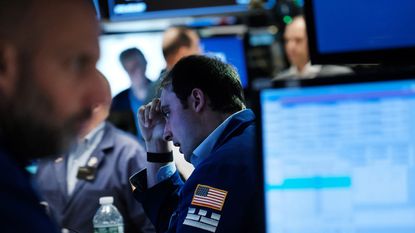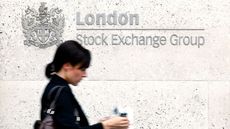The markets say sell, but should investors listen?
As fear grips markets around the world, investors need to have an honest conversation about what they’re comfortable with owning.


These are incredibly challenging markets. It seems as if investors and traders have made up their minds that asset prices are going lower. Every time a piece of news emerges, no matter how bad or good, the selling begins.
How should investors react to this environment? In my opinion there is no clear answer.
In times like these, many market commentators and analysts will roll out the common refrain that holding on is the best way to manage volatility as asset prices always recover in the long term.
Subscribe to MoneyWeek
Subscribe to MoneyWeek today and get your first six magazine issues absolutely FREE

Sign up to Money Morning
Don't miss the latest investment and personal finances news, market analysis, plus money-saving tips with our free twice-daily newsletter
Don't miss the latest investment and personal finances news, market analysis, plus money-saving tips with our free twice-daily newsletter
While this is correct, I think the advice is often misleading. It’s true there is a high probability markets will be higher in ten years than they are today, but this refers to the stock market in general.
The only way to replicate this performance would be to own an index tracker fund. It’s not necessarily true of individual investments or even active investment funds.
Picking winners is always going to be a challenge
Multiple studies have shown that in the long-term the vast majority of market returns come from just a handful of stocks. These companies perform so well they more than make up for the drag of underperformers.
The chances of finding these companies is tiny. By one estimate, just just 4% of stocks in the S&P 500 account for more than 90% of its returns. Flip that figure on its head and you get a 96% chance of picking the wrong stock.
This is the reason why I think it’s a mistake to subscribe to the mentality that the best course of action in uncertain times is to do nothing.
Some companies will not emerge from the current economic storm in one piece.
Other companies will emerge stronger.
Investors need to have an honest discussion with themselves about whether or not the enterprises they own in their portfolio have what it takes to survive and thrive over the next year and beyond.
Indeed, in the UK we face a unique set of economic circumstances. As well as the energy crisis, the country is also dealing with the disruption of Brexit and political uncertainty.
Other countries have their own unique problems. The risk of blackouts in Europe over the winter is growing, and the chances of another debt crisis in Italy are also building.
Meanwhile, the US is struggling with runway inflation, ageing infrastructure, political roadblocks and a surging dollar, which is likely to hit corporate earnings.
Every market has its own strengths, weaknesses, opportunities and threats. Navigating all of these is going to be a challenge. There’s just no sugar coating that fact.
There’s no sense kidding yourself
This is why investors need to be honest and realistic about the holdings they own. I believe the companies with the best chances of being able to chart a course through this storm are the ones plugged into multi-decade macro themes, think healthcare, cloud computing, fintech, luxury goods and data.
The companies that are likely to struggle are those in sectors exposed to the economic cycle and disruption, such as industrials, brick-and-mortar retail and potentially even oil and gas (yes you read that right).
Oil and gas groups are awash with cash today, but they’re still exposed to a range of risks. These include windfall taxes, environmental levies and regulation. The current energy crisis could also accelerate the transition to green energy, which could lump them with tens of billions of pounds in stranded assets (I said this was a challenging time to be an investor).
Unfortunately, renewable generators are just as exposed to windfall taxes and additional regulation.
In these markets investors need to choose which risks they’re most comfortable with taking, and most importantly try and keep a balanced view on the world. The outlook for the global economy might seem awful right now, but as history shows, periods of economic stress are usually followed by growth and prosperity. Finding the companies that can make it through, and come out on the other side ready to take advantage of the opportunities on offer is vital.
There’s no sense hanging on to businesses that are really struggling and on the verge of collapse in the hopes they’ll be able to turn it around.
The world is changing and investors need to appreciate this fact. As the economist and investor John Maynard Keynes once said, “When the facts change, I change my mind - what do you do, sir?”
Rupert is the Deputy Digital Editor of MoneyWeek. He has been an active investor since leaving school and has always been fascinated by the world of business and investing.
His style has been heavily influenced by US investors Warren Buffett and Philip Carret. He is always looking for high-quality growth opportunities trading at a reasonable price, preferring cash generative businesses with strong balance sheets over blue-sky growth stocks.
Rupert was a freelance financial journalist for 10 years before moving to MoneyWeek, writing for several UK and international publications aimed at a range of readers, from the first timer to experienced high net wealth individuals and fund managers. During this time he had developed a deep understanding of the financial markets and the factors that influence them.
He has written for the Motley Fool, Gurufocus and ValueWalk among others. Rupert has also founded and managed several businesses, including New York-based hedge fund newsletter, Hidden Value Stocks, written over 20 ebooks and appeared as an expert commentator on the BBC World Service.
He has achieved the CFA UK Certificate in Investment Management, Chartered Institute for Securities & Investment Investment Advice Diploma and Chartered Institute for Securities & Investment Private Client Investment Advice & Management (PCIAM) qualification.
-
-
 Investment trust discounts hit 2008 levels. Here’s how to profit
Investment trust discounts hit 2008 levels. Here’s how to profitInvestment trust discounts have risen to levels not seen since 2008, here are three trusts looking to buy to profit.
By Rupert Hargreaves Published
-
 A luxury stock to buy at a high street price
A luxury stock to buy at a high street priceInvestors wrongly consider Watches of Switzerland a high-street outlet.
By Dr Matthew Partridge Published
-
 3 UK shares to buy yielding up to 17%
3 UK shares to buy yielding up to 17%Tips 3 UK shares top stocks to buy now, according to Alex Harvey of Momentum Global Investment Management.
By Rupert Hargreaves Published
-
 Why UK firms should start buying French companies
Why UK firms should start buying French companiesOpinion The French are on a buying spree, snapping up British companies. We should turn the tables, says Matthew Lynn, and start buying French companies. Here, he outlines some potentially attractive-looking deals.
By Matthew Lynn Published
-
 Upcoming IPOs in 2022: which companies are planning to list this year?
Upcoming IPOs in 2022: which companies are planning to list this year?News Rupert Hargreaves explains what an IPO is, how public and private companies differ, and picks out some of the more notable companies set to list on the stock exchange this year.
By Rupert Hargreaves Published
-
 Will HSBC be torn apart?
Will HSBC be torn apart?News Banking giant HSBC has pleased the market with a new dividend policy. But its top shareholder thinks it should be split in two. Matthew Partridge reports.
By Dr Matthew Partridge Published
-
 Britain’s resilient blue chips – a refuge in the inflationary storm
Britain’s resilient blue chips – a refuge in the inflationary stormNews The UK's blue-chip FTSE 100 index has been the best-performing major stockmarket index so far this year.
By Alex Rankine Published
-
 James de Uphaugh: why shifting perceptions are good for UK stocks
James de Uphaugh: why shifting perceptions are good for UK stocksPodcasts Merryn talks to James de Uphaugh of the Edinburgh Investment Trust about why a “change in perception” of energy, mining, defence and bank stocks means the UK market could be well-placed to outperform.
By moneyweek Published
-
 Aston Martin fuelled by Saudi Arabian cash
Aston Martin fuelled by Saudi Arabian cashNews Saudi Arabia’s Public Investment Fund has injected £78m into Aston Martin and will take part in a separate £575m rights issue, making it the carmaker’s second-largest shareholder, with 17% of the shares and two seats on the board.
By Dr Matthew Partridge Published
-
 Harry Potter publisher Bloomsbury should ride out the economic storm
Harry Potter publisher Bloomsbury should ride out the economic stormAnalysis Bloomsbury – publisher of the Harry Potter books – saw sales boom during lockdown, and it expects to ride out the cost of living crisis too. Rupert Hargreaves delves into the figures.
By Rupert Hargreaves Published









